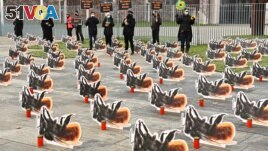21 January 2021
The world's top insect experts say our planet's important insect population is going through a "death by a thousand cuts."
A new group of studies suggests Earth is losing around 1 to 2 percent of its insects each year. The losses are blamed on climate change, pollution, agriculture, land use changes and chemicals.

FILE - Environmental activists of Campact group stage a protest with some 200 oversized cardboard bees installed in front of the Chancellery on December 2, 2020 in Berlin, to call for more insect protection. (Photo by Tobias Schwarz / AFP)
David Wagner of the University of Connecticut is the lead writer of the 12 studies, which recently appeared in Proceedings of the National Academies of Sciences. The research involved 56 scientists from around the world.
The problem, sometimes called the insect apocalypse, is a complex issue. Even scientists say they do not fully understand it. And the complexity of the issue makes it hard to get the public interested in possible solutions.
Wagner said scientists need to find out if the levels of insect loss are bigger in comparison to other species. "There is some reason to worry more," he added, "because they [insects] are the target of attack" with insecticides, herbicides and light pollution.
Insecticides and herbicides are special kinds of chemicals that can kill insects or plants.
May Berenbaum of the University of Illinois helped lead the research. She compared the insect losses to climate change 30 years ago. She said back then, the methods used to measure the degree and rate of climate change effects were difficult.
Berenbaum says another issue is that many people simply hate insects. She added that this is true even though the small creatures do a lot of good. They pollinate the world's foods, get rid of waste and play an important part in the food chain.
Insects are "the fabric by which Mother Nature and the tree of life are built," Wagner said.
Fabric is a kind of woven or knitted material. The term can also mean the basic structure of something.
Wagner said two famous insects, honeybees and Monarch butterflies, are good examples of the current problems insects face. Honeybees have been disappearing because of disease, parasites, insecticides, herbicides and lack of food.
Drier weather in the U.S. West, driven by climate change, means less milkweed for butterflies to eat, Wagner said. And changes in American agriculture remove weeds and flowers they need for nectar.
"We're creating a giant biological desert except for soybeans and corn in a giant area of the Midwest," he said.
The recent scientific papers do not provide new data. They show a big but incomplete picture of a problem that is starting to get more attention. Scientists have identified 1 million insect species, while up to 4 million more are likely to be discovered, Berenbaum said.
Doug Tallamy of the University of Delaware was not part of the studies. But he said the research demonstrates how the world has "spent the last 30 years spending billions of dollars finding new ways to kill insects and mere pennies working to preserve them."
Pennies are a small amount of money.
In an email to the Associated Press, Tallamy said the good news was that people themselves can do a lot to stop insect losses. "This is a global problem with a grassroots solution," he wrote.
I'm John Russell.
Seth Borenstein reported on this story for the Associated Press. John Russell adapted it for Learning English. Bryan Lynn was the editor.
_____________________________________________________________
Words in This Story
apocalypse – n. a great disaster : a sudden and very bad event that causes much fear, loss, or destruction
species – n. a group of animals or plants that are similar and can produce young animals or plants
pollinate – v. to give (a plant) pollen from another plant of the same kind so that seeds will be produced food
chain – n. a series of types of living things in which each one uses the next lower member of the series as a source of food — usually used with the
parasite – n. an animal or plant that lives in or on another animal or plant and gets food or protection from it
nectar – n. a sweet liquid produced by plants and used by bees in making honey
preserve – v. to keep (something) in its original state or in good condition
grassroots – n. the ordinary people in a society or organization : the people who do not have a lot of money and power